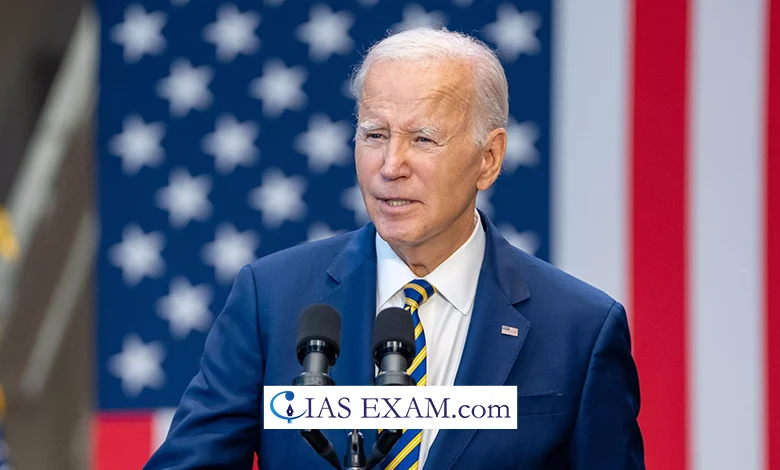Xenophobia’s Influence on India-China Economic Relation
Syllabus: International Relations [GS Paper-2]

Context
Xenophobia, or the fear of strangers, has been a persistent issue in many countries, including India and China. Recently, US President Joe Biden attributed the economic troubles of these two nations to their alleged xenophobic policies.
Key Points
- President Biden’s Remarks: In a statement, President Biden thinks that the economic woes of China, Japan, and India are the consequences of xenophobia, in other words they face economic challenges as they are yet to accept multiculturalism.
- Economic Growth Comparison: On the new report from the World Bank, on the issue of decline forecasted, the IMF had expected each country worldwide to register slower growth in 2024 and hence projected Indian economy at 6.8% and the United States at 2.7%, which is relatively faster than the growth registered last year.
- Migration’s Role in the US Economy: Biden said the migration had contributed to create a booming economy for America unlike the states referred to like the mentioned Asian countries.
- Xenophobia and Nationalism in China: Based on the critical analysis research, in the event COVID-19 period, it is observed that a number of people in China are starting to be xenophobic and nationalist, which could lead to a policy of self-reliance and decoupling from international cooperation.
- Impact on India: However, particular details might be missing on the way xenophobia directly affects India’s economic growth. But, what can be said for sure is that openness to immigrants’ addition to the country can only be beneficial to the country’s economy.
What is Xenophobia?
- Xenophobia represents a category where lots of different bad thoughts and behaviours towards foreigners or people who are not the same as us are gathered.
- This can take different forms among others, like the stereotype, hatred and violence.
- Xenophobia that can be experienced by immigrants or by those who are kind of considered as a threat or as a different kind of people.
Impact of Xenophobia on India’s Economy
- India is facing xenophobia with immensely predominant expression which is chiefly addressed towards immigrants and refugees.
- The country has for ages received and blessed people from virtually all corners of the earth. It has been the custom of the most recent times, however there is an emerging wave of people against strangers that comes from elsewhere.
- This has resulted in less amount of foreign investment, tourist and trade businesses which have in the end had a negative impact on the country’s economy.
- Xenophobic tendencies also caused a release of skilled Indians to get away from the country in search of greener pastures in other countries where there are increased opportunities.
Impact of Xenophobia on China’s Economy
- China, as well, is confronted with xenophobias kindred topics, just like the example of hostility towards people from the Southwest region in South Africa.
- The country has a big population of foreign workers, mainly from Africa and Southeast Asia, who are being made to take blame for the ill-treatment and violence.
- Furthermore, there is a contraction in foreign investment and exchange which indirectly influence China’s GDP and domestic economy.
- Moreover, xenophobia also provided a shortage of skilled labour since many foreign workers are not interested in working in a hostile environment.
Conclusion
Xenophobia is a complex issue that affects not only individuals but also the economy of a country. India and China, two of the world’s largest economies, have been grappling with xenophobia, which has resulted in a decline in foreign investment, tourism and trade. The recent statement by US President Joe Biden has brought attention to this issue, and it is essential for both countries to address xenophobia to promote economic growth and development. By welcoming immigrants and fostering an inclusive environment, India and China can unlock their full economic potential and become more significant players in the global economy.
Source: The Indian Express
UPSC Mains Practice Question
Q. Analyse the impact of xenophobia on the economic relations between India and China, exploring its manifestations, underlying causes, and potential strategies for fostering cooperation amidst such challenges.





.png)



